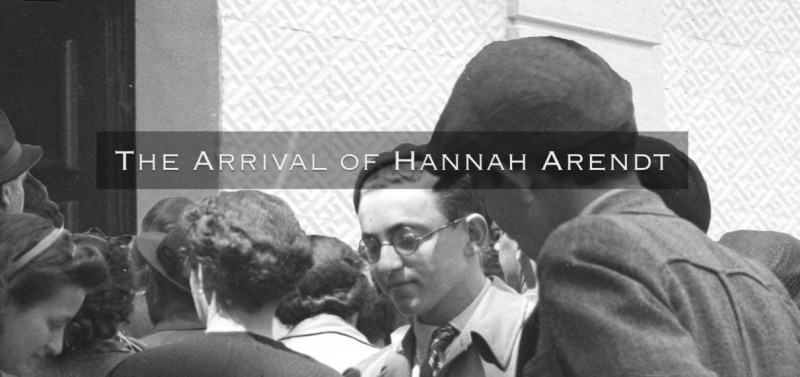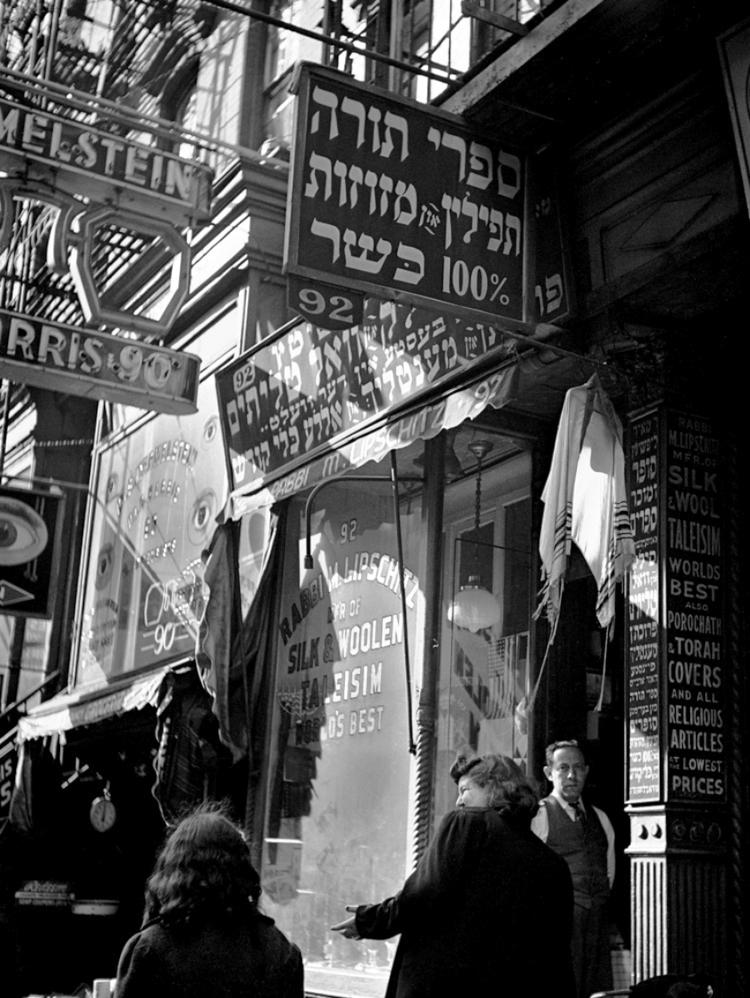
The Arrival of Hannah Arendt
This film describes the arrival of Hannah Arendt - a Jewish, German-American political theorist and publicist - in New York and her reflections on flight and helping people start over.

Wednesday, March 5, 1940
My first Dollar
The fact that I cry at every turn is such a misfortune. My uncle brought me a box of stockings today. He had gone of his customers where there was a great sale on stockings, so he bought three boxes: one for my aunt, one for Selma, and one for me. What is there to cry about? Selma glanced at the socks and said, „Thanks, Pa!“ My aunt clutched her head because he had spent so much money on stockings. „A stocking-fair,“ she yelled. „Three boxes! Thank goodness there wasn’t a sale on wives. Abetche (I bet) you would have brought half a dozen women home with you.“ When my uncle gave my my box of stockings and I wanted to thank him, I got all chocked up, and tears came into my eyes.
In the evening, Red came, and my aunt told him that I already have a dzhob collecting pieces in Rubins‘ factory but that I need to know English. Red immediately started teaching me what I need to know for my job. „Kom ove‘ heyer“-„Come here“ he said in a combination of English and his weak Yiddish. „Don‘ bee layzee,“ he continued. „Tayk eet eezee,“ and so on. In the middle of the „lesson“ Eddie came in. They both started to teach me how to spell. I sat with a piece of paper and a penciland each of my rabbis on either side of me. „A real cheder“ my aunt joked. But Selma was out of sorts. „Dat’s fooleesh“ she said. I konw that when Selma says something is foolish is means that she’s angry. But what can I do if they both really want to quickly and with great energy, announcing that he had found me a dzshob.
„A dzshob?“ everyone shouted at once. „Yeah, a dzshob. For now, just one night. The laundryman caught a cold in his back, and he’s in bed. His wife needs to send laundry to the customers tomorrow and her packages need to be bundled up. Come, Greenhorn! I’ll take you to her, and you’ll earn a dollar and a half. Here, as soon you earn your first dollar, you’re an American; you’re practically a seeteezen.“ I grabbed my coat and went with Mendl Pushcart to the laundress to earn my first dollar in America and become a citizen. „Here’s the greenhorn“ Mendl said, introducing me. The minute we got to the door, he left to go back and play pinochle with my aunt and Mrs. Shore.
The laundress taught me how to tie up the packages and what to write on them. Count the sheertz and write down a figer. Count the tawvelz and write a figer. Overnight I learned the meaning of shirts, towels, sheets, and more. The laundress ironed, and I tied the packages and wrote numbers on them. At first, she was silent, showing me how to fold the shirts around cardboard so they remained starched, without wrinkles. „Don’t make creases“, she said. „A crease is worse than anything for these people. A crease is black mark in the laundry business.“ After a few hours, when it was already the middle of the night, she began to talk. At home in Europe she had studien to be a dentist and was already „practicing“ as a student in Shimonovski’s School of Dentistry in Warsaw. And here in America she had become a lawndreelaydee, ironing underwear and wasting her life. She ended her story of the past thirty years and quietly sang a familiar Russian song about a fast-moving troika.
I came home at dawn. My aunt opened the door and asked, „So, have you become a citizen?“ I showed her the three silver half dollars that the laundress had given me.“Set aside one coin“ my aunt said. „People say that the first silver coin you earn is a good luck charm.“ When I went to sleep, I remembered Mendl Pushcart and thought that he wasn’t so bad after all. He was right. I really did feel like a „citizien“ this morning when I earned my first American dollar.
The author of the novel “A Jewish Refugee in New York” Kadya Molodovsky is one of the most important Yiddish poets of the mid-20th century. She was born in 1894 in Bereza Kartuska, Russian Empire and experienced the typical trajectory of Jewish migration of the 20th century: Odessa, Kyiv, Warsaw, New York, Tel Aviv. In the course of life she worked as a teacher, editor, poet, critic, playwright and writer. When World War I broke out, she worked in a day home for Jewish children who had fled, run by her teacher in Warsaw. She continued this work in various places until 1917. Later she moved to Odessa to escape the war front and worked in a kindergarten there. In 1917, after the October Revolution, she could not return to her parents, and so remained in Kyiv, where she again took a job as a kindergarten teacher. Surviving the pogrom in Kyiv in 1920, she published her first poem.
In 1935 she moved to New York, where she published her book “In Land fun Mayn Gebayn” (“In the Land of My Bones”). In it, she addresses the internalization of exile in fragmentary poems. From this point on, her work in New York flourished.
In her work “A Jewish Refugee in New York,” Kadya Molodowsky presents the life of Rivke Zilberg, a twenty-year-old refugee from Lublin in New York, in the form of a diary. Rivke Zilberg’s experiences have a certain similarity with Molodovsky’s fate. The diary covers such topics as: Flight, Arrival, Holocaust, acculturation and more.
Kadya Molodovsky (translated by Anita Norich), 2019: A Jewish Refugee in New York. A Novel by Kadya Molodovsky. Bloomington: Indiana University Press, p. 28-29.